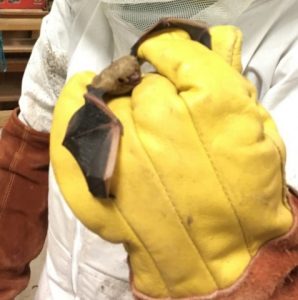Coming in contact with bats…
People often know when they ve been bitten by a bat, but most types of bats have very small teeth which may leave marks that disappear quickly.
If you are bitten by a bat — or if infectious material (such as saliva or brain material if it is killed) from a bat gets into your eyes, nose, mouth, or a wound — wash the affected area thoroughly with soap and water and get medical advice immediately. Whenever possible, the bat should be captured and sent to a laboratory for rabies testing.
People can t get rabies just from seeing a bat in an attic, in a cave, at summer camp, or from a distance while it is flying. In addition, people can t get rabies from having contact with bat guano (feces), blood, or urine, or from touching a bat on its fur.
If you think your pet has been bitten by a bat, contact a veterinarian or your health department for assistance immediately and have the bat tested for rabies. Remember to keep vaccinations current for cats, dogs, and other animals.
What if you’re not sure?
If you woke up because a bat landed on you while you were sleeping or if you awakened and found a bat in your room, you should try to safely capture the bat and have it tested. The same precautions should be used if you see a bat in a room with an unattended child, or see a bat near a mentally impaired or intoxicated person.
The small teeth of the bat can make a bite difficult to find. Be safe and in these situations, try to safely capture the bat, have the bat tested, and seek medical advice. Source
Bats in our Houston Community
Hello Houstonians bat season is upon us again. If you have not been outside to enjoy our great weather you may not have noticed. We have an enormous bat population here in our city. Don’t be alarmed they don’t all carry rabies. Bats are actually a great benefit to our community. They keep the insect population regulated naturally. [no_toc]
Bats in Houston are a big concern for a lot of residents. Houston Bats consist of thirteen different species. The most common is the Mexican Free Tailed bat. Some of our bats migrate and some are constant residents. Their gestation period (baby season) is from May 15th – August 1st. During this period of time the babies are unable to fly which limits Houston Wildlife Removal the ability to remove from homes and businesses.
Bats do take up residence in our homes and businesses very frequently. They may go unnoticed for an extended period of time which gives them the ability to grow the colony within the structure. Once The Critter Team conducts our inspection of the building we develop a plan of action to start the removal process. We first locate the entry and exit points for the bat colony. The second step is to seal the entire building to ensure that they do not make any new entry points. The Critter Team installs bat removal devices at this point to get them out and keep them out. We leave the device installed until all bats are out. All our bat removal work is backed up with a written guarantee.
Once the bat removal is complete, you may need some attic restoration depending on the size of the colony and the length of time they were present. Houston Wildlife Removal will remove all contaminated insulation, disinfect, sanitize, and deodorize. Then we install new insulation to meet or exceed our areas code (R30).
If you have any Bat Removal questions please call us for Houston Wildlife Removal.

